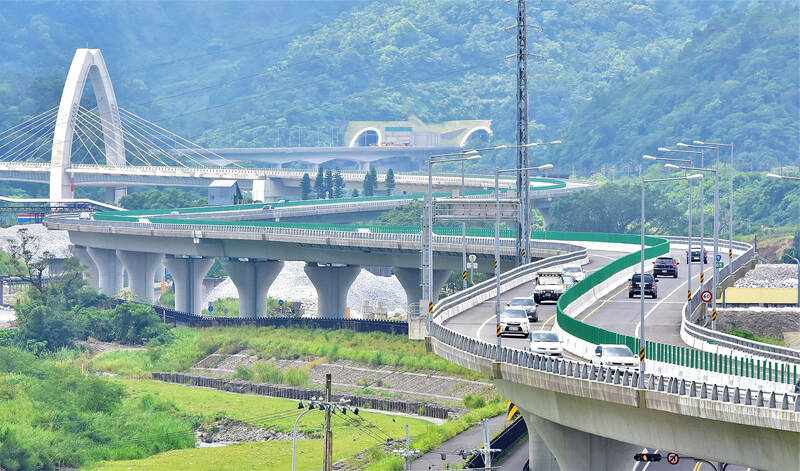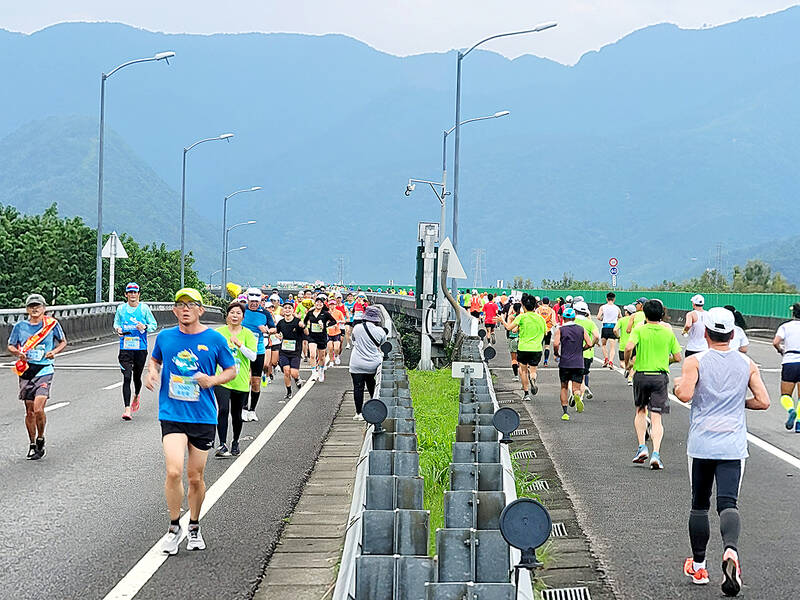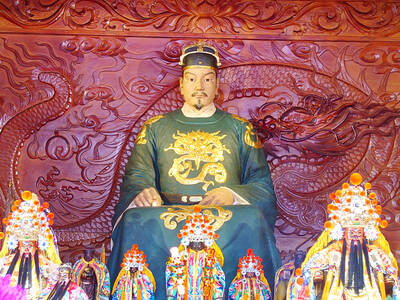Fu Kun-chi (傅崐萁), current Chinese Nationalist Party (KMT) heavyweight legislator and longtime “King of Hualien,” has been a busy man. Last month he proposed a draft statute that would govern the construction of a highway through the Rift Valley between Hualien and Taitung counties. That was accompanied by similar draft proposals for extending the high speed rail system around the island and for pushing Freeway No. 6 through the mountains to Hualien. That last proposal echoed former Taichung mayor Jason Hu’s (胡志強) old proposal for a tunnel through the Central Mountain Range to link Fu’s birthplace, Taichung, with his current fiefdom, Hualien. Taichung, it should be recalled, is run by KMT Mayor Lu Shiow-yen (盧秀燕).
The projects, which resemble the classic construction-industrial state projects of the KMT heyday, are backed by other prominent KMT politicians. According to reports in the Taipei Times, Legislative Speaker Han Kuo-yu (韓國瑜) and Deputy Legislative Speaker Johnny Chiang (江啟臣) co-sponsored bills on the around-the-nation high-speed rail system and the extension of Freeway No. 6. Indeed, the KMT marched the bills into committee for review and on March 15, KMT legislators marched into the legislature holding signs calling for full support of the Freeway No. 6 extension and the HSR. When Han ran for president, extending the HSR around the island was one of his programs.
The Ministry of Transport and Communications (MOTC) said in a written report to the legislature that it had been evaluating the highway proposal since October of 2020 and that its feasibility evaluation should be released in August. It said that its policy is to prefer railways to highways, emphasizing public transportation on the east coast, “supplemented by private motor vehicles.”

Photo: Chiang Chih-hsiung, Taipei Times
ECOLOGICAL AND SOCIAL DISASTER
As proposed, the highway is an environmental and social disaster. Estimated to be 174 kilometers long, with 17 interchanges, it crosses the lands of nearly a dozen indigenous communities — who have say over whether their land is used — and travels through geologically sensitive areas. The cost is estimated at NT$255 billion. Once the HSR line and the Freeway No. 6 extension are added in, the cost will likely run into the trillions. Yet, Taitung County has a smaller population than Kaohsiung’s Fengshan District (鳳山), while Taitung city itself is barely two-thirds the size of Taichung’s Fengyuan District (豐原).
Well-known Taiwan commentator Brian Hioe (丘琦欣) observed that Fu’s machinations to get himself made caucus convener for the KMT in the legislature may reflect a desire to cash in on the kickbacks that will inevitably arise when these giant projects are built. Fu has served time for corruption cases and has been accused of tax evasion by the local prosecutor’s office.

Photo: Tung Chen-kuo, Liberty Times
Perhaps that is the case. No doubt when the HSR line is finally approved there will be a spate of stories in the media about politicians who purchased the land around them. There will also be another spate about how the patronage spending has helped the KMT feed and water its local networks by showering them with cash.
Fu is a skilled politician. In addition to serving as Hualien County magistrate, he has served in the legislature before, has chaired the Budget Committee and currently sits on the National Defense Committee. Fu is thus uniquely positioned to be aware of the effects of these large infrastructure projects on the budget.
And on defense.
The MOTC report on the Hualien-Taitung project warned that it would cause government spending to surge. The HSR and the extension of Freeway No. 6 across the mountains would pile more on that. I wonder if that is their intention.
The cross-island problem is particularly tempting and exciting because at present there is no four-lane highway that crosses the deep mountains. The existing routes are all subject to blockage by slides, causing politicians to grope at massive construction-industrial state solutions like tunneling directly under the mountains. When Ma Ying-jeou (馬英九) was running for president he promised to restore Highway No. 8 between Guguan (谷關) and Lishan (梨山) in Taichung, a two-lane route constantly in peril of either falling off the mountainside or being blocked by landslides. Today the work on the road keeps many locals employed.
DEFENSE
The construction-industrial state has another effect, though, besides enabling local politicians to bring home bacon to their districts: crowding out defense spending. Money that is spent bringing the HSR to tiny communities on the east coast is not going to be spent building drone factories and missile assembly lines.
The classic case of this is Japan, the construction-industrial political economy par excellence. For decades the US has prodded Tokyo to spend more on defense. Instead, Japan binged on public construction. It could not spend on defense, Tokyo maintained, partly because the 1947 Public Finance Law forbade the government from funding debt by issuing bonds. Faced with a rising challenge from Beijing, in 2022 the government decided to earmark US$3.22 billion for defense facilities and the construction of destroyers, among other expenditures, to be funded by ... selling construction bonds for public works projects. Tokyo’s choice made the connection obvious.
Taiwan’s defense spending for this year will hit a new record of 2.5 percent of GDP: NT$440 billion, or around twice the cost of Fu’s proposed and completely unnecessary Hualien-Taitung highway. To put it another way, if the proposed highway funding were instead devoted to defense, Taiwan’s defense budget would rise by 50 percent, robustly exceeding the very modest 3 percent figure the US has long demanded. If Fu wanted to reward his patrons, he could use the money to build a large drone factory in Hualien or Taitung to churn out drones for civilian and military applications.
I would argue that one long-unrecognized purpose of ever more gigantic construction-industrial state projects is not just “development” or even feeding and watering local patronage networks. I think they are more insidious: they leverage democratic processes to prevent Taiwan from assembling the budgetary resources it needs for defense by creating local constituencies for local construction expenditures.
The same budget this year that saw military spending reach unprecedented levels? It saw a 0.3 percent increase in public infrastructure spending, to NT$588 billion, roughly 1.3 times the record military budget.
Time to reverse these figures.
Notes from Central Taiwan is a column written by long-term resident Michael Turton, who provides incisive commentary informed by three decades of living in and writing about his adoptive country. The views expressed here are his own.

On a harsh winter afternoon last month, 2,000 protesters marched and chanted slogans such as “CCP out” and “Korea for Koreans” in Seoul’s popular Gangnam District. Participants — mostly students — wore caps printed with the Chinese characters for “exterminate communism” (滅共) and held banners reading “Heaven will destroy the Chinese Communist Party” (天滅中共). During the march, Park Jun-young, the leader of the protest organizer “Free University,” a conservative youth movement, who was on a hunger strike, collapsed after delivering a speech in sub-zero temperatures and was later hospitalized. Several protesters shaved their heads at the end of the demonstration. A

In August of 1949 American journalist Darrell Berrigan toured occupied Formosa and on Aug. 13 published “Should We Grab Formosa?” in the Saturday Evening Post. Berrigan, cataloguing the numerous horrors of corruption and looting the occupying Republic of China (ROC) was inflicting on the locals, advocated outright annexation of Taiwan by the US. He contended the islanders would welcome that. Berrigan also observed that the islanders were planning another revolt, and wrote of their “island nationalism.” The US position on Taiwan was well known there, and islanders, he said, had told him of US official statements that Taiwan had not

The term “pirates” as used in Asia was a European term that, as scholar of Asian pirate history Robert J. Antony has observed, became globalized during the European colonial era. Indeed, European colonial administrators often contemptuously dismissed entire Asian peoples or polities as “pirates,” a term that in practice meant raiders not sanctioned by any European state. For example, an image of the American punitive action against the indigenous people in 1867 was styled in Harper’s Weekly as “Attack of United States Marines and Sailors on the pirates of the island of Formosa, East Indies.” The status of such raiders in

As much as I’m a mountain person, I have to admit that the ocean has a singular power to clear my head. The rhythmic push and pull of the waves is profoundly restorative. I’ve found that fixing my gaze on the horizon quickly shifts my mental gearbox into neutral. I’m not alone in savoring this kind of natural therapy, of course. Several locations along Taiwan’s coast — Shalun Beach (沙崙海水浴場) near Tamsui and Cisingtan (七星潭) in Hualien are two of the most famous — regularly draw crowds of sightseers. If you want to contemplate the vastness of the ocean in true